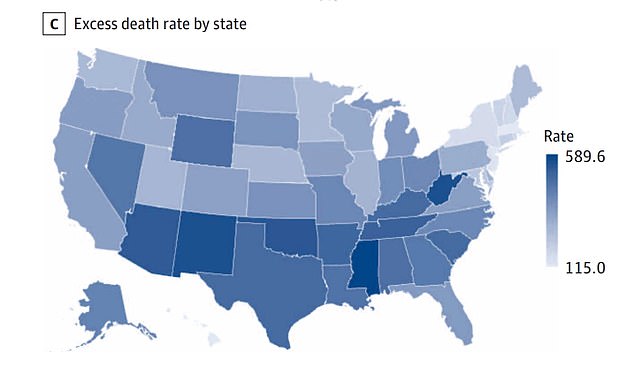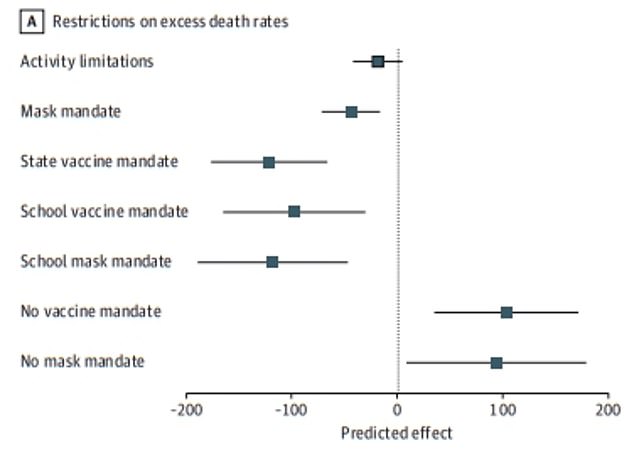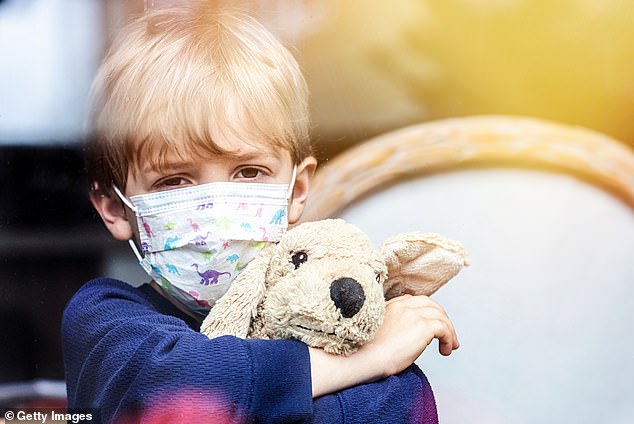Some restrictions designed to limit the spread of Covid caused more harm than good, a major study suggests.
The research found that closing schools had little effect on virus death rates in the US but “harmed” children’s “educational outcomes.”
Meanwhile, stay-at-home orders, restaurant, bar and gym closures, and visitation restrictions at nursing homes did nothing to save lives and caused “harmful social isolation.”
“The absence of evidence that these (restrictions) … reduced deaths from the pandemic suggests that they may have been applied too aggressively in some states,” the study said.
However, the analysis found that controversial measures such as mandatory mask wearing and vaccine passports saved hundreds of thousands of lives across the United States.
School closures had little effect on virus death rates in the US, but ‘hurt’ children’s ‘educational outcomes’ (stock)

Excess deaths are deaths that occurred between 2020 and 2022 that exceeded the baseline. Many of the states where these deaths were highest were Republican-led and in the South.
This comes weeks after Dr. Anthony Fauci, who was instrumental in many of the anti-Covid measures, admitted that many of them were not based on any solid science.
The new analysis, conducted by researchers at the University of Virginia, looked at CDC mortality and population data from all 50 states from 2020 to 2022.
The results were compared with data from 2017 to 2019.
During those two years of the pandemic, there were 1.2 million excess deaths, or deaths from any cause that were above average.
Many of these excesses would have been caused by Covid itself.
But previous research has shown that harms associated with lockdowns were also responsible for excess deaths, including undiagnosed cancers, heart attacks, delayed hospital treatment and suicides.
The study found that states that imposed the strictest and longest restrictions, such as New York and parts of the Northeast, experienced lower death rates.
For example, the 10 states with the most severe restrictions had an excess death rate of 282 per 100,000 over the two-year period.
That figure was a third lower than the 417 per 100,000 estimated for the 10 states that imposed the “weakest” restrictions, many of which were Republican-led and in the South.
The analysis estimated that if all 50 states had imposed the strictest level of restrictions, there would have been up to 250,000 fewer excess deaths.
While there would have been up to 447,000 more deaths if all states had refused to implement vaccine passports and mask mandates.
However, the study highlights that many social factors were at play.
People in Southern states that suffered large excess deaths were more likely to work in blue-collar and other manual jobs, meaning they did not have the luxury of working from home and avoiding others.
These states are also more likely to have high levels of obesity and diabetes, which increases the risk of dying from COVID-19. They also have fewer hospitals and doctors.
The study estimated that behavioral changes, such as working from home, avoiding crowded places and getting vaccinated, accounted for 50 to 75 percent of the reduction in deaths.

The analysis found that controversial measures such as mask mandates and vaccination passports in schools and generally in society reduced COVID-19 deaths. Negative numbers suggest a protective effect, while positive numbers indicate a negative effect on deaths. Activity limitations refer to mandatory closures of restaurants, bars, and schools; stay-at-home orders; and restrictions on leisure activities and public gatherings.
The positive association between masks and lower mortality rates conflicts with other major studies that found they made little difference to the spread of Covid.
The research on COVID-19 vaccination is stronger: those who got vaccinated were much less likely to die from the virus, especially among older people.
The study acknowledged that some Covid restrictions caused long-term damage, the extent of which is still unknown.
“Prior research indicates that school closures harm educational outcomes,” wrote University of Virginia economics professor Christopher Ruhm, the paper’s sole author.
‘The lack of evidence that these measures also reduced deaths from the pandemic suggests they may have been applied too aggressively in some states.
‘On the other hand, school mask mandates were likely more effective and imposed lower costs (on the government).
‘Similarly, the social isolation experienced by nursing home residents was detrimental, raising questions about activity limitations that restricted this group’s personal interactions.’
The study was published on Friday in JAMA Health Forum.


